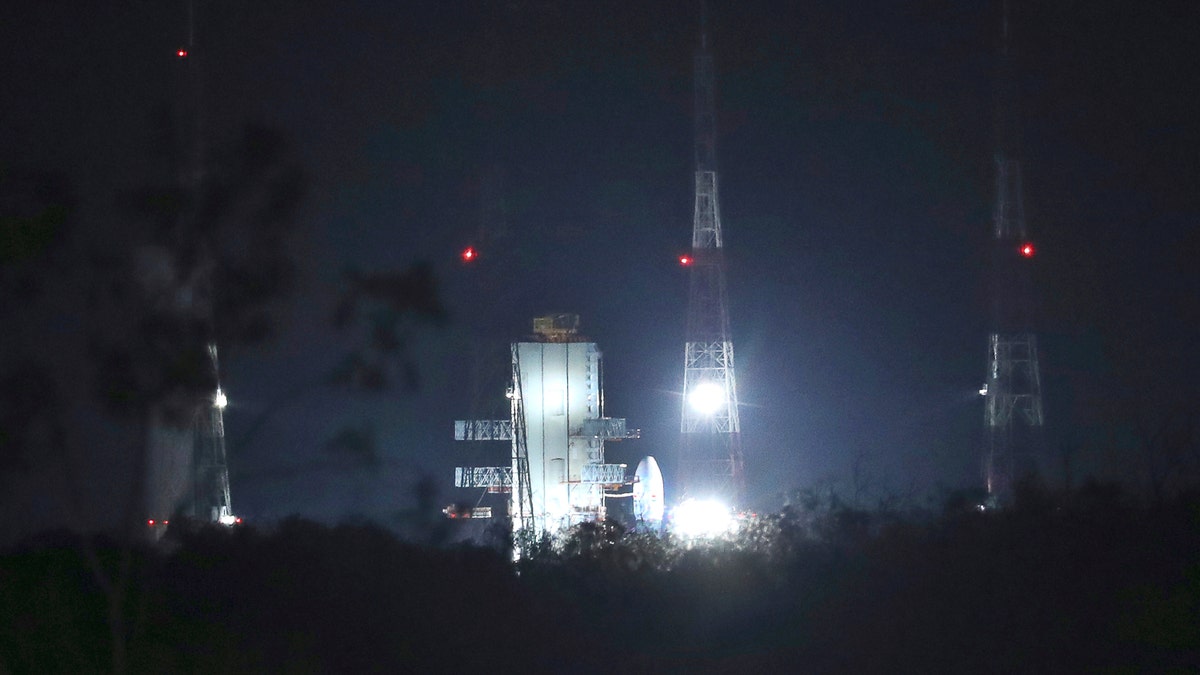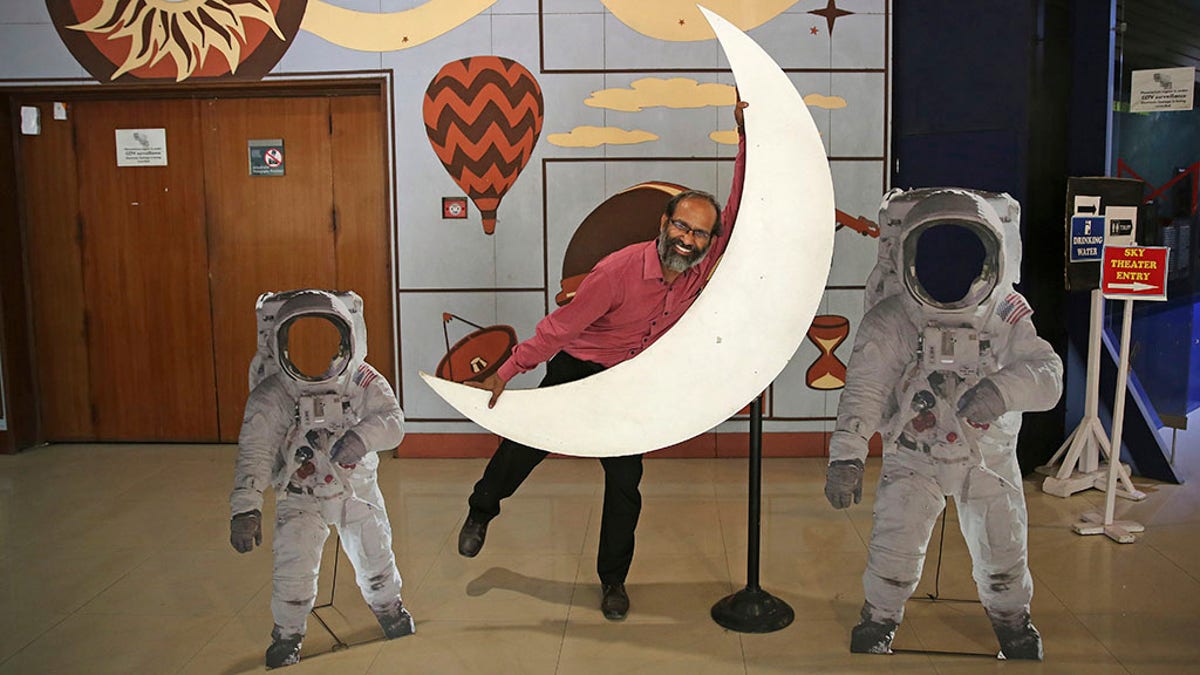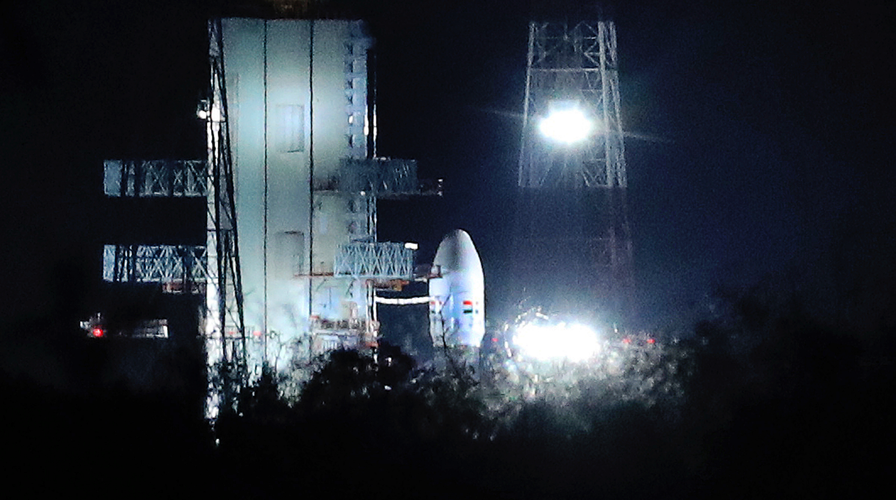Fox News Flash top headlines for July 18
Fox News Flash top headlines for July 18 are here. Check out what's clicking on Foxnews.com
India’s space agency in Chennai announced it will launch a spacecraft to the south pole of the Moon on Monday, after halting the attempt this week.
The Indian Space Research Organization (ISRO) said Thursday the Chandrayaan-2 mission launch is now set at 2:43PM local time on Monday, adding that the cause of the previous technical error has been identified and corrected.
On Monday, the earlier launch attempt was called off less than an hour before the 640-ton, 14-story rocket lifted off.
Chandrayaan-2, the Sanskrit word for “moon craft,” is designed to land on the lunar south pole and send a rover to explore water deposits that were confirmed by its previous 2008 lunar mission, Chandrayaan-1. The mission will also analyze minerals and map the unexplored south pole’s surface with a camera, seismometer, a thermal instrument and a NASA-supplied laser retroreflector to help calculate the distance to the Earth.
The mission will “boldly go where no country has ever gone before,” said the ISRO in a statement.
NASA SEEKS FUNDS FOR RETURN TO MOON

Indian Space Research Organization (ISRO)'s Geosynchronous Satellite launch Vehicle (GSLV) MkIII carrying Chandrayaan-2 stands at Satish Dhawan Space Center after the mission was aborted at Sriharikota in southern India, Monday, July 15, 2019. India has called off the launch of a moon mission to explore the lunar south pole. The Chandrayaan-2 mission was aborted less than an hour before takeoff on Monday. An Indian Space Research Organization spokesman says a "technical snag" was observed in the 640-ton launch-vehicle system. (AP Photo/Manish Swarup)
Dr. K. Sivan, chairman of the ISRO, said the around $140 million mission is the nation’s most prestigious to date, in part because of the technical complexities of landing on the Moon’s surface. It is an event he describes as “15 terrifying minutes.”
With India growing as the world’s fifth-largest economy, India’s Prime Minister Narendra Modi is determined to show his country’s security and technological prowess on the global stage.
India successfully test-fired an anti-satellite weapon in March, which Modi said demonstrated the country’s capability as a space power alongside the United States, Russia and China. It also plans to send humans into space by 2022, becoming only the fourth nation to do so.
However, India is not alone in its ambitions as it competes with other nations in the international space race.
The U.S. – which celebrates on Saturday the 50th anniversary of the Apollo 11 mission that made Neil Armstrong and Buzz Aldrin the first humans on the moon – is working to send a manned spacecraft to the planetoid’s south pole by 2024. Israel, additionally, attempted to land an unmanned spacecraft on the moon back in April but failed when the first privately funded lunar landing crashed.
APOLLO 11'S EPIC MISSION TO THE MOON IN PICTURES

An employee playfully hugs a cut-out of a crescent moon at the Nehru Planetarium in New Delhi, India, Thursday, July 11, 2019. India is looking to take a giant leap in its space program and solidify its place among the world’s spacefaring nations with its second unmanned mission to the moon, this one aimed at landing a rover near the unexplored south pole. (AP Photo/Altaf Qadri)
Critics have questioned the expense of the mission in the 1.3-billion-person country plagued by widespread poverty and high child mortality rates. Author and economic commentator Gurcharan Das, however, said the cost of the second lunar mission is small compared with India’s overall budget and that the moonshot could have a multiplier effect on the economy.
Das also urged New Delhi to get the country’s private sector more involved in the mission’s research and development, which he said could yield “huge benefits” beyond the realm of space exploration.
CLICK HERE TO GET THE FOX NEWS APP
Many are interested in the lunar south pole because of its largely-shadowed portion, presenting a greater possibility of water. Water is an essential ingredient for life, and finding it is part of science’s greater goal of determining whether there is life elsewhere in our solar system; India’s rover will be the first to look for water at the south pole.
“These days, it has become the place to go,” said space expert Nandivada Rathnasree.
Fox News' Morgan Cheung and the Associated Press contributed to this report.

